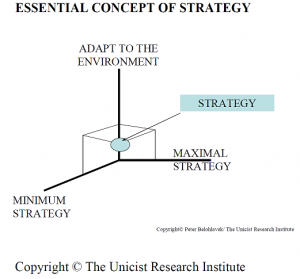The following excerpt is from the Unicist book titled The Unicist Approach to Businesses by Peter Belohlavek.
Universal strategy is defined as the conscious action to influence an environment to achieve an objective. This objective implies growth. The procedure to develop astrategy is defined by its taxonomy.
There is a universal taxonomy for strategy building that is presented in this abstract, but each application field requires its specific taxonomy considering its ontogenesis.
Therefore strategy implies being aware of the actual reality understanding the implicit trends and knowing the threats and opportunities.
Conscious actions imply necessarily a trade-off. Individuals and institutions grow because they appropriate more energy than they deliver.
Therefore strategies are only successful in the long run when the procedure of strategies includes a solution to minimize the cost of the delivered value.
Strategies always include the following agents: the individual or organization, a “competitor” and a “client”. Competitors are those who are willing to occupy the same vital space. Clients are those who receive the added value one delivers. The client can be the whole environment as an entity or an individual.
Strategies include naturally two elements to adapt to reality: an active element to increase the vital space while adding value and an energy conservation function to ensure the survival of the organization or individual.
Thus from an operational standpoint a strategy is basically defined by the integration of a maximal strategy and a minimum strategy to adapt to the environment.
Adaptation does not imply overadaptation. Adaptation implies influencing the environment while being influenced by it.

